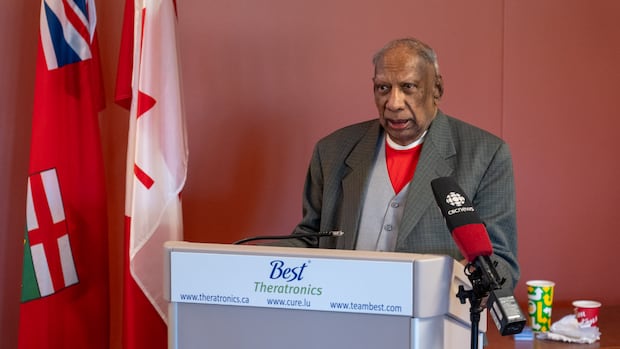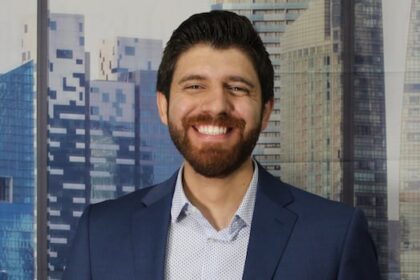Ottawa·NewThe owner of an Ottawa medical manufacturer operating in violation of its nuclear licence says he has no intention of complying with Canada’s nuclear regulator, which last year ordered Best Theratronics to restore a $1.8 million financial guaranteeThe Canadian Nuclear Safety Commission ordered Best Theratronics to restore its financial guarantee last yearCampbell MacDiarmid · CBC News · Posted: Oct 16, 2025 6:00 PM EDT | Last Updated: 29 minutes agoKrishnan Suthanthiran, owner of Best Theratronics, an Ottawa medical manufacturer under orders from the Canadian Nuclear Safety Commission to restore its financial guarantee. speaks at a news conference on Friday. (Francis Ferland/CBC)The owner of an Ottawa medical manufacturer operating in violation of its nuclear licence says he has no money to comply with Canada’s nuclear regulator, which last year ordered Best Theratronics to restore a lapsed financial guarantee.In November 2024, the Canadian Nuclear Safety Commission (CNSC) issued two orders against Best Theratronics, a manufacturer of cancer treatment devices using Cobalt-60 radioactive isotopes.The company was in a protracted labour dispute with striking workers, and one order related to safety concerns at the shuttered plant. The second required Best Theratronics to secure a $1.8-million financial guarantee, to be used for clean up costs in the event that the plant needed to be decommissioned.Nearly a year on, owner Krishnan Suthanthiran says he has no money to pay, but insists the CNSC is in the wrong. “No banks will give us a loan,” he said Thursday during a news conference at the facility in Ottawa’s Kanata neighbourhood.”My cost of having a finished licence is $2 million here — I cannot afford that,” he said, threatening to move his operations to India or the United States. The financial guarantee the CNSC imposed was unduly onerous, Suthanthiran believed.”CNSC is in violation of its own rules,” he claimed.Company still in violationThe CNSC confirmed Best Theratronics remains in violation of its nuclear licence, but would not say what action it would take in pursuit of compliance. “The issue remains under active regulatory review and CNSC staff have brought additional information to the Commission’s attention for its consideration,” a spokesperson told CBC in an email, declining to provide further information.As the regulator of Canadian nuclear facilities, the CNSC can issue orders and fines to licensees. It also has the authority revoke licences and launch prosecutions. Suthanthiran is making a “mockery” of the CNSC, according to Green Party Leader Elizabeth May, who accused the commission of being too close to the industry it regulates. “The Canadian Nuclear Safety Commission has been described as a captive regulator for good reason for a very long time,” she said. “But this is at the level of a bad actor.”Best Theratronics “shouldn’t still have a licence to operate,” she said. ‘We cannot find skilled workers’Before becoming Best Theratronics, the company was a division of Crown corporation Atomic Energy of Canada, producing the world’s first cobalt-based cancer therapy systems in the 1950s. It was later sold to MDS Nordion before Suthanthiran acquired the company in 2008 for a reported $15 million. Suthanthiran, who was born in India and studied at Carleton University in the 1970s, had built a global empire of medical manufacturing companies, including a Belgian company that was placed into administration in 2012 after Belgian authorities accused Suthanthiran of illegally draining funds from the company and walking away.On Thursday, Suthanthiran said he planned to end manufacturing requiring a nuclear licence in Canada. Some operations could continue at the company’s plant in Kanata without a licence, he said. “Canada is not business-friendly,” he said.Suthanthiran said he was struggling to hire qualified staff after many employees left during the strike, when the union representing many of the plant’s workers dubbed him “Canada’s worst boss.” “This company used to have more than nearly 200 employees. Now we have about 60 employees,” he said, “We cannot find skilled workers,” he continued. “We [could] hire 50 machinists. We can’t find them.”ABOUT THE AUTHORCampbell MacDiarmid is a reporter with the CBC Ottawa bureau
Thursday, 5 Mar 2026
Canada – The Illusion
Search
Have an existing account?
Sign In
© 2022 Foxiz News Network. Ruby Design Company. All Rights Reserved.
You May also Like
- More News:
- history
- Standing Bear Network
- John Gonzalez
- ᐊᔭᐦᑊ ayahp — It happened
- Creation
- Beneath the Water
- Olympic gold medal
- Jim Thorpe
- type O blood
- the bringer of life
- Raven
- Wás’agi
- NoiseCat
- 'Sugarcane'
- The rivers still sing
- ᑲᓂᐸᐏᐟ ᒪᐢᑿ
- ᐅᑳᐤ okâw — We remember
- ᐊᓂᓈᐯᐃᐧᐣ aninâpêwin — Truth
- This is what it means to be human.
- Nokoma











